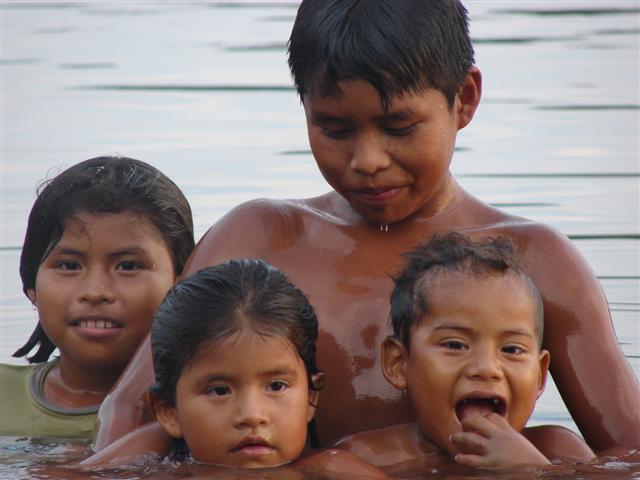 ::cck::171::/cck::
::cck::171::/cck::
::introtext::
When tourism is directly associated with conservation units, the balance between maximizing the quality of the visitor experience and minimizing the negative environmental effects of this activity become important.
::/introtext::
::fulltext::
The lower Rio Negro has characteristics that make it a tourism magnet in Amazonas State. These characteristics include the scenic beauty of the black water rivers, conservation areas in excellent state of conservation, beautiful natural beaches created during low river seasons, accommodation in the region’s cities and hotel and airport infrastructure in the city of Manaus.
Community-Based Tourism in the Lower Rio Negro has been an IPÊ initiative since 2003. The focus of this project is the regulation of tourism activities that integrate conservation interests with those of regional development. To this end, our actions involve partnerships with local governments, the tourism trade and the community.
Our efforts with the local public sector aim to improve tourism and management of the region’s natural attractions. This directly involves institutions responsible for conservation units. Several assisted in the development of initiatives: the Public Use Plan benefited from the involvement of the Tupé Sustainable Development Reserve, ICMBIO contributed to the elaboration of the Emergency Public Use Plan for Anavilhanas National Park and the elaboration of a business plan for visitors to the Rio Negro State Park–North and South Sectors.
Complementary activities in the project involve tourism representatives in regulating tourism activities. Project members participate in several local initiatives, such as the creation of a code of conduct for visitors to conservation units and training activities for organizations in these areas (travel agencies, guides, canoers, boat owners, and jungle hotels).
Community involvement in biodiversity conservation is reached through various IPÊ projects in the region. In relation to tourism, the Project seeks to identify and involve communities where these activities already exist in nascent form. Here, Project initiatives are directed to supporting, planning and training communities in economic activities related to hosting tourists and visitors. Other endeavors include: training for production of folk-art and regional cuisine, exchanges of experience between communities, short courses to train local guides and use of environmental interpretation in forest trails.
::/fulltext::
::ac_acordeon::4::/ac_acordeon::
::cck_ac_acordeon::acordeon::/cck_ac_acordeon::
::ac_titulo_acordeon|0|ac_acordeon::Objectives::/ac_titulo_acordeon|0|ac_acordeon::
::ac_texto_acordeon|0|ac_acordeon::
- Contribute to the socio-economic conservation of the lower Rio Negro mosaic through community-based tourism
- Effectuate this type of tourism as a development alternative for the region;
- Integrate the different stakeholders in the mosaic of conservation units through information and training.
::/ac_texto_acordeon|0|ac_acordeon::
::cckend_ac_acordeon::::/cckend_ac_acordeon::
::cck_ac_acordeon::acordeon::/cck_ac_acordeon::
::ac_titulo_acordeon|1|ac_acordeon::Development::/ac_titulo_acordeon|1|ac_acordeon::
::ac_texto_acordeon|1|ac_acordeon::
- 2003- Workshop for the regulation of visits to the lower Rio Negro; introduce the resident communities in the region to the topic of conservation units;
- 2005 – Start of workshops for regulation of tourism (participants included IPÊ, tourism and environmental officials and the tourism trade); Support the creation of a code of conduct for visitors to the lower Rio Negro;
- 2006 – Creation of a business plan for the development of sustainable tourism in Rio Negro State Park –North and South sectors;
- 2007 – Workshops for regulating visits to the lower Rio Negro;
- 2008 – Support for the creation of a Public Use Plan for the Tupé Sustainable Development Reserve and support for the creation of an emergency plan for public use of Anavilhanas National Park;
- 2009 – Training guides and local instructors in the municipalities of Manaus and Novo Airão. Beginning evaluations of the efficacy of actions proposed by the Project;
- 2010 – Project Support for Initiatives of Community-Based Tourism in the Southern Region of Anavilhanas National Park; creation of the Groups for Tourism in State Conservation Units;
::/ac_texto_acordeon|1|ac_acordeon::
::cckend_ac_acordeon::::/cckend_ac_acordeon::
::cck_ac_acordeon::acordeon::/cck_ac_acordeon::
::ac_titulo_acordeon|2|ac_acordeon::Team::/ac_titulo_acordeon|2|ac_acordeon::
::ac_texto_acordeon|2|ac_acordeon::
Nailza Pereira de Sousa
Oscar Sarcinelli
Sherre Prince Nelson
Eduardo Badialli
::/ac_texto_acordeon|2|ac_acordeon::
::cckend_ac_acordeon::::/cckend_ac_acordeon::
::cck_ac_acordeon::acordeon::/cck_ac_acordeon::
::ac_titulo_acordeon|3|ac_acordeon::Support::/ac_titulo_acordeon|3|ac_acordeon::
::ac_texto_acordeon|3|ac_acordeon::
- ICMBio – Chico Mendes Institute for Biodiversity Conservation – Technical Cooperation in Anavilhanas National Park.
- MTur –Ministry of Tourism
- PCE –Ecological Corridors Project / MMA – Ministry of the Environment
- SDS – Secretary for the Environment and Sustainable Development of Amazonas State / CEUC –State Center for Conservation Units – Technical Cooperation for State Conservation Units in the Lower Rio Negro
- SEMMAS – Secretary of the Environment and Sustainability of Manaus municipality – Technical Cooperation for the Sustainable Development Reserve of Tupé.
- USAID – United States Agency for International Development /Forest Enterprise Cluster.
- Grupo Martins


::/ac_texto_acordeon|3|ac_acordeon::
::cckend_ac_acordeon::::/cckend_ac_acordeon::
::ac_arquivos::1::/ac_arquivos::
::cck_ac_arquivos::arquivo::/cck_ac_arquivos::
::ac_titulo_arquivo|0|ac_arquivos::::/ac_titulo_arquivo|0|ac_arquivos::
::ac_arquivo|0|ac_arquivos::::/ac_arquivo|0|ac_arquivos::
::cckend_ac_arquivos::::/cckend_ac_arquivos::
::ac_galeria::11::/ac_galeria::
::cck_ac_galeria::galeria::/cck_ac_galeria::
::ac_foto_descricao|0|ac_galeria::::/ac_foto_descricao|0|ac_galeria::
::ac_foto|0|ac_galeria::images/artigo_completo/galeria/1288/000011-small-073b5590b1.jpg::/ac_foto|0|ac_galeria::
::cckend_ac_galeria::::/cckend_ac_galeria::
::cck_ac_galeria::galeria::/cck_ac_galeria::
::ac_foto_descricao|1|ac_galeria::::/ac_foto_descricao|1|ac_galeria::
::ac_foto|1|ac_galeria::images/artigo_completo/galeria/1288/anavilhanas-small-3fb4aee8c3.jpg::/ac_foto|1|ac_galeria::
::cckend_ac_galeria::::/cckend_ac_galeria::
::cck_ac_galeria::galeria::/cck_ac_galeria::
::ac_foto_descricao|2|ac_galeria::::/ac_foto_descricao|2|ac_galeria::
::ac_foto|2|ac_galeria::images/artigo_completo/galeria/1288/cuieiras-056-small-2efda15703.jpg::/ac_foto|2|ac_galeria::
::cckend_ac_galeria::::/cckend_ac_galeria::
::cck_ac_galeria::galeria::/cck_ac_galeria::
::ac_foto_descricao|3|ac_galeria::::/ac_foto_descricao|3|ac_galeria::
::ac_foto|3|ac_galeria::images/artigo_completo/galeria/1288/cuieiras-small-a6ecedcc3b.jpg::/ac_foto|3|ac_galeria::
::cckend_ac_galeria::::/cckend_ac_galeria::
::cck_ac_galeria::galeria::/cck_ac_galeria::
::ac_foto_descricao|4|ac_galeria::::/ac_foto_descricao|4|ac_galeria::
::ac_foto|4|ac_galeria::images/artigo_completo/galeria/1288/dsc03065-small-c97d3b1f3a.jpg::/ac_foto|4|ac_galeria::
::cckend_ac_galeria::::/cckend_ac_galeria::
::cck_ac_galeria::galeria::/cck_ac_galeria::
::ac_foto_descricao|5|ac_galeria::::/ac_foto_descricao|5|ac_galeria::
::ac_foto|5|ac_galeria::images/artigo_completo/galeria/1288/dsc03177-small-722413466c.jpg::/ac_foto|5|ac_galeria::
::cckend_ac_galeria::::/cckend_ac_galeria::
::cck_ac_galeria::galeria::/cck_ac_galeria::
::ac_foto_descricao|6|ac_galeria::::/ac_foto_descricao|6|ac_galeria::
::ac_foto|6|ac_galeria::images/artigo_completo/galeria/1288/dsc03483-small-2588d792f5.jpg::/ac_foto|6|ac_galeria::
::cckend_ac_galeria::::/cckend_ac_galeria::
::cck_ac_galeria::galeria::/cck_ac_galeria::
::ac_foto_descricao|7|ac_galeria::::/ac_foto_descricao|7|ac_galeria::
::ac_foto|7|ac_galeria::images/artigo_completo/galeria/1288/fotos3-015-small-91176ea8f5.jpg::/ac_foto|7|ac_galeria::
::cckend_ac_galeria::::/cckend_ac_galeria::
::cck_ac_galeria::galeria::/cck_ac_galeria::
::ac_foto_descricao|8|ac_galeria::::/ac_foto_descricao|8|ac_galeria::
::ac_foto|8|ac_galeria::images/artigo_completo/galeria/1288/img0030-small-5431a4af86.jpg::/ac_foto|8|ac_galeria::
::cckend_ac_galeria::::/cckend_ac_galeria::
::cck_ac_galeria::galeria::/cck_ac_galeria::
::ac_foto_descricao|9|ac_galeria::::/ac_foto_descricao|9|ac_galeria::
::ac_foto|9|ac_galeria::images/artigo_completo/galeria/1288/img0056-small-7ec34425cf.jpg::/ac_foto|9|ac_galeria::
::cckend_ac_galeria::::/cckend_ac_galeria::
::cck_ac_galeria::galeria::/cck_ac_galeria::
::ac_foto_descricao|10|ac_galeria::::/ac_foto_descricao|10|ac_galeria::
::ac_foto|10|ac_galeria::images/artigo_completo/galeria/1288/img4250-small-f019dbc9de.jpg::/ac_foto|10|ac_galeria::
::cckend_ac_galeria::::/cckend_ac_galeria::


